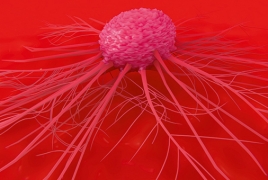New method to detect early-stage cancer identified February 8, 2020 - 11:22 AMT PanARMENIAN.Net - A new method to detect cancer in its early stages using a targeted MRI contrast agent that binds to proteins has been identified by a team of researchers led by Georgia State University Regents' Professor Jenny Yang, Medical Xpress reports. In their study, published in the journal Science Advances, Yang and her colleagues at Georgia State and Emory University describe a newly identified biomarker for detection of liver metastases. With current tests like biopsies, cancer in the liver is often detected in advanced stages, which can limit treatment options and lower overall survival rates. The discovery could have wide-ranging impacts, including more effective diagnosis and precision treatment, and less risk to patients. "This is a game changer. It has the possibility to have many more applications, really for any type of cancer," said Yang. "We are already applying it to 10 different types of cancer in the lab." The researchers, whose work is funded by the National Cancer Institute, developed an agent that can target certain receptors—in this case, chemokine receptor 4 (CXCR4). The receptor is overexpressed in common metastasis organs, such as the liver, among people who have cancer. The CXCR4 targeted protein-based MRI contrast agent is expected to overcome major barriers in early diagnosis by showing even tiny instances of cancer cells on multi-color scans called precision MRI (pMRI), a new imaging methodology. Using MRI technology, contrast agents carry the element gadolinium to enhance the images. During her previous work analyzing calcium, Yang decided to test how a metal, like gadolinium, would interact with protein. The protein wraps around the element and carries it to the site for imaging. Yang's team found that protein design is much more effective in targeting the signs of disease. "Currently, it is difficult to see early stages of disease in the liver, even in invasive biopsy," said Yang. "Diagnostic testing using this contrast agent can not only identify the presence of disease but differentiate the stages of disease with high sensitivity and accuracy. That's the beauty of this work." The findings are so promising, the targeted protein contrast agent is now being fast-tracked by the U.S. Food and Drug Administration (FDA) in the first step toward clinical trials to gauge its efficacy in humans. Authorities said a total of 192 Azerbaijani troops were killed and 511 were wounded during Azerbaijan’s offensive. In 2023, the Azerbaijani government will increase the country’s defense budget by more than 1.1 billion manats ($650 million). The bill, published on Monday, is designed to "eliminate the shortcomings of an unreasonably broad interpretation of the key concept of "compatriot". The earthquake caused a temporary blackout, damaged many buildings and closed a number of rural roads. Partner news |